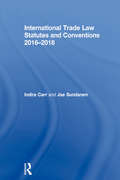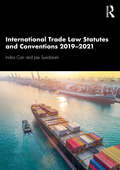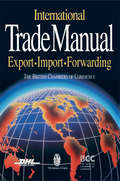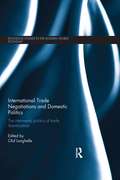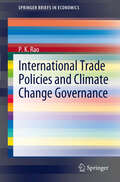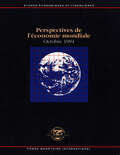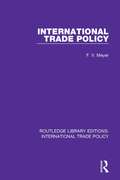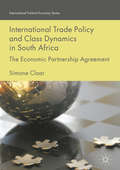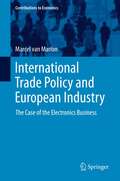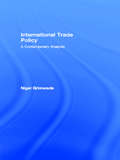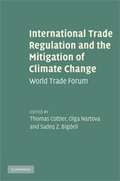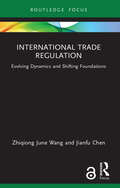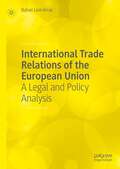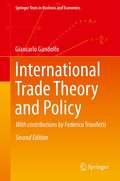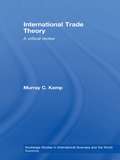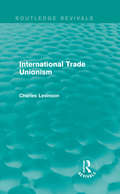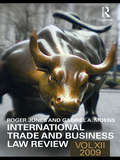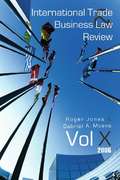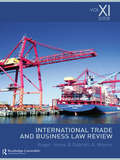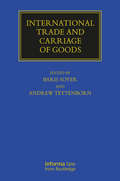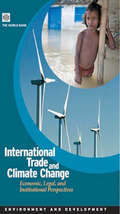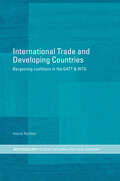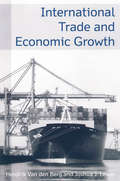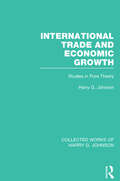- Table View
- List View
International Trade Law Statutes and Conventions 2016-2018
by Indira Carr Jae SundaramInternational Trade Law Statutes and Conventions 2016-2018 presents all the key legislation for international trade law in one student-friendly volume. Developed in response to feedback from lecturers and students, this book is: • up-to-date with the law: this book provides a fully current and comprehensive collection of legislation • tailored to course outlines: content has been curated to align with international trade law courses • exam friendly: conforming to regulations, this is an un-annotated text that is suitable for exam use • easy to use: a clear and attractive text design, detailed table of contents and multiple indices provides ease of reference and navigation Ideal for course and exam use, as well as for reference, this book is a perfect companion resource for student learning and exam success.
International Trade Law Statutes and Conventions 2019-2021
by Indira Carr Jae SundaramInternational Trade Law Statutes and Conventions 2019–2021 presents all the key legislation for international trade law in one student-friendly volume. Developed in response to feedback from both lecturers and students, the book: provides an up-to-date, fully comprehensive collection of current legislation is curated to align with international trade law courses is an un-annotated text, conforming to regulations so that it can be used during exams features a clear and attractive text design, detailed table of contents, and multiple indices to provide ease of reference and navigation. Ideal for coursework, exam use, and general reference work, this is the perfect companion for anyone studying this important and fast-moving area of law.
International Trade Manual
by British Chambers of CommerceThe International Trade Manual is the definitive book about export, import and freightforwarding for business people and students of further and higher education. It is vital reading for anyone involved in international commerce and is the leading textbook for students taking International Trade and Services (ITAS) S/NVQ Levels 3 (supervisors) and 4 (managers) in international trade. This comprehensive guide details exactly what you need to know if you want your business to profit from foreign trade. Endorsed by the British Chambers of Commerce and The Institute of Export, its contents include everything from customs documentation to credit risk.Professionals working in international commerce will also find the reference sections invaluable. These contain checklists, forms, relevant legislation, regulations and a directory of further information sources. Trainers, lecturers, students, managers and supervisors will all benefit from using this highly effective training resource.
International Trade Negotiations and Domestic Politics: The Intermestic Politics of Trade Liberalization (Routledge Studies in the Modern World Economy #121)
by Oluf LanghelleIn spite of many years of negotiation on trade liberalization, progress seems to have stalled. This book explores why resistance to further market liberalization seems so strong, given that the benefits are seen to outweigh the costs. This volume argues that in order to understand the slow progress of World Trade Organization negotiations, we need to take into consideration the ‘intermestic’ character of trade politics, that is, the way in which international and domestic aspects of politics and policies have been woven together and become inextricably related to each other. This is a general trend in our globalizing world, and one that is most pronounced in the case of trade politics and policy. International Trade Negotiations and Domestic Politics therefore presents an in-depth analysis of institutions, ideas, interests and actors in the interplay between international trade negotiations and national negotiating positions. At the international level the authors focus on the multilateral negotiations within the World Trade Organization, together with the plurilateral and bilateral negotiations on free trade agreements. At the regional and domestic level they analyze the trade politics and policies of two established powers, the European Union and the USA; two rising powers, China and India; and a small industrialized country with an open economy, Norway.
International Trade Policies
by International Monatry FundA report from the International Monetary Fund.
International Trade Policies and Climate Change Governance
by P. K. RaoThis work offers a synthesis of the current approaches toward an integration of international trade and climate change, with a view to fostering potential improvements in policies and institutions affecting these. A number of pragmatic measures are proposed with reference to the WTO and the United Nations Framework Convention on Climate Change (UNFCCC) regimes, which are expected to contribute toward enhanced climate change governance, as well as promoting international trade.
International Trade Policies: Imf Involvement In International Trade Policy Issues (World Economic Outlook Ser. #World Economic And Financial Surveys)
by International Monetary FundA report from the International Monetary Fund.
International Trade Policy (Routledge Library Editions: International Trade Policy #14)
by F.V. MeyerThe main contention of this book, first published in 1978, is that international trade policy must fit the economic structure of the trading countries. The first two chapters, which compare the nineteenth and twentieth century movements towards freer trade, and show the nature of the export structure and pricing, provide the two main themes of the book: policy and the sort of industries on which the policies work.
International Trade Policy and Class Dynamics in South Africa
by Simone ClaarThis book provides an innovative perspective on class dynamics in South Africa, focusing specifically on how different interests have shaped economic and trade policy. As an emerging market, South African political and economic actions are subject to the attention of international trade policy. Claar provides an in-depth class analysis of the contradictory negotiation processes that occurred between South Africa and the European Union on Economic-Partnership Agreements (EPA), examining the divergent roles played by the political and economic elite, and the working class. The author considers their relationships with the new global trade agenda, as well as their differing standpoints on the EPA.
International Trade Policy and European Industry: The Case of the Electronics Business
by Marcel Van MarionTrade policy has played a vital role in the decline of European electronics business. The events that resulted in the disappearance of the European television industry, of a European and Japanese video recorder format and of other European consumer electronics are directly related to market structures in exporting countries and business practices. In this book, factual business data shows and economic models explain how restrictive trade practices result in elimination of efficient competitors in export markets. It deals with the memorable case how a videocassette recorder format was established by dumping and how politics enabled it. An innovative tariff increase for CD players was invalidated by heavy dumping, causing closure of production in Europe. European CTV industry succumbed under permanent dumping and a series of biases - as the interest of a state-owned company - and serious errors making trade instruments void and rules irreconcilable with international agreements. Practical and theoretical examples and explanations, some in detail, of trade rules are provided. The book sketches events - carelessness, prejudice or special interests, arbitrary and false application of trade instruments and fraud - resulting in disappearance of various European electronics business segments.
International Trade Policy: A Contemporary Analysis
by Nigel GrimwadeThis volume provides an introduction to the basic theory behind international trade policy. The author analyses current policy issues within a theoretical framework. The book adopts a thematic approach, with each chapter examining a different issue - each of which is of central importance to contemporary trade policy. The book will be essential for all those who want to understand what governments do, in terms of trade policy and how they do it.
International Trade Regulation and the Mitigation of Climate Change
by Thomas Cottier Olga Nartova Sadeq Z. BigdeliWhat can trade regulation contribute towards ameliorating the GHG emissions and reducing their concentrations in the atmosphere? This collection of essays analyses options for climate-change mitigation through the lens of the trade lawyer. By examining international law, and in particular the relevant WTO agreements, the authors address the areas of potential conflict between international trade law and international law on climate mitigation and, where possible, suggest ways to strengthen mutual supportiveness between the two regimes. They do so taking into account the drivers of human-induced climate change in energy markets and of consumption.
International Trade Regulation: Evolving Dynamics and Shifting Foundations (Routledge Research in International Economic Law)
by Zhiqiong June Wang Jianfu ChenThe international trade regulatory system is a dynamic system that has been evolving throughout its history. Tension and conflict are part of the system. While calls for the abolition of the principal trade regulation authority, the WTO, have failed to understand this nature of the system, proponents for reforms have so far not paid sufficient attention to the evolving nature of tension and conflict. This book examines the evolving dynamics in international trade regulation from the conclusion of GATT in 1947 to the current crisis facing the WTO, from a perspective of emerging powers of developing countries with a focus of China as the latest force that demands reforms of the international trade regulatory regime. There is an extensive body of scholarship on ideological struggles, the rise of developing countries, geopolitical contest, the emerging powers (especially China), the use, misuse or abuse of trading rules and so on. There is, however, a lack of a single concise research book that synthesises these underlying causes and factors into a coherent and precise analytical theme. This book attempts to fill this research gap by building upon the existing scholarship and placing the various tensions and conflicts in a perspective that treats them as dynamic factors that have propelled a continuing process of evolution of the international trade regulation. The book will interest those researching on international trade regulation as well as development studies.
International Trade Relations of the European Union: A Legal and Policy Analysis
by Rafael Leal-ArcasThis book examines the need for greater legal coherence within international trade negotiations between the European Union (EU) and external trade relations. An introspective analysis of EU trade law and policy is presented that highlights the complex issue of EU unity. A particular focus is given to the Doha Round and the General Agreement on Trade in Services, with empirical analysis placing the negotiations not just within the context of international trade law, but also within broader social and political contexts. This book aims to provide an interdisciplinary understanding of the EU’s international trade negotiations. It will be relevant to researchers and policy-makers interested in international trade and EU law.
International Trade Theory and Policy
by Federico Trionfetti Giancarlo GandolfoIn the present text the author deals with both conventional and new approaches to trade theory and policy, treating all important research topics in international economics and clarifying their mathematical intricacies. The textbook is intended for undergraduates, graduates and researchers alike. It addresses undergraduate students with extremely clear language and illustrations, making even the most complex trade models accessible. In the appendices, graduate students and researchers will find self-contained treatments in mathematical terms. The new edition has been thoroughly revised and updated to reflect the latest research on international trade.
International Trade Theory: A Critical Review
by Murray KempMurray C. Kemp is one of Australia's foremost economists. He has held positions across the world including London School of Economics, U.C. Berkeley, Columbia University, McGill University, MIT, and latterly Macquarie University. Kemp was a Member of Council for the Econometric Society and was a Distinguished Fellow of the Economics
International Trade Unionism: International Trade Unionism (Routledge Revivals)
by Charles LevinsonAs Secretary General of the ICF and previously Assistant General Secretary of the IMF, Charles Levinson played an important part in developing the countervailing labour response to the multinational corporations. His earlier work, Capital, Inflation and the Multinationals (Routledge Revivals, 2013) displayed the force of his insight into the dynamics of modern economics and technology. First published in 1972, this book considers the opportunities which allow unions to command an increasing share in decisions that shape the worker’s destiny. Chapters include discussions on the multinational corporations, industrial democracy and the ideas behind collective bargaining.
International Trade and Business Law Review: Volume X
by Roger Jones Gabriël A. MoensThe International Trade and Business Law Review publishes leading articles, comments and case notes, as well as book reviews dealing with international trade and business law, arbitration law, foreign law and comparative law. It provides the legal and business communities with information, knowledge and understanding of recent developments in international trade, business and international commercial arbitration. The Review contributes in a scholarly way to the discussion of these developments while being informative and having practical relevance to business people and lawyers. The Review also devotes a section to the Willem C. Vis International Commercial Arbitration Moot and publishes the memoranda prepared by teams coached by Professor Gabriël A. Moens. The Review is edited at the Murdoch University School of Law in Perth, Australia. The Editors-in-Chief are Mr Roger Jones, Partner, Latham & Watkins LLP, Chicago and Gabriël A. Moens, Dean and Professor of Law, Murdoch Law School. It is an internationally-refereed journal. The Review is supervised by an international board of editors that consists of leading international trade law practitioners and academics from the European Union, the United States, Asia and Australia. The Student Editors for Volume XII are Sybil Almeida, Gianni Bei, Luke Rotondella, and Nicholas Summers from the Murdoch Law School.
International Trade and Business Law Review: Volume X
by Roger Jones Gabriël A. MoensCompiled by leading international trade law practitioners and academics from across the globe, this volume provides legal and business communities with information, knowledge and an understanding of recent developments in international trade, business and international commercial arbitration. Scholarly in style, this volume contributes to the discussions surrounding the developments whilst being informative and of practical use to the business community and lawyers. Covering the areas of international trade and business law, arbitration law, foreign law and comparative law, with one section devoted to the Willem C. Vis International Commercial Arbitration Moot, it contains: leading articles comments case notes book reviews. International Trade and Business Law Review is an invaluable resource for post-graduate students and business and legal professionals, primarily studying and working in the UK, USA and Australia.
International Trade and Business Law Review: Volume X
by Roger Jones Gabriël A. MoensThe International Trade and Business Law Review publishes leading articles, comments and case notes, as well as book reviews dealing with international trade and business law, arbitration law, foreign law and comparative law. It provides the legal and business communities with information, knowledge and understanding of recent developments in international trade, business and international commercial arbitration. The Review contributes in a scholarly way to the discussion of these developments while being informative and having practical relevance to business people and lawyers. It also devotes a section to the Willem C. Vis International Commercial Arbitration Moot and publishes the memoranda prepared by teams coached by Professor Gabriël A. Moens. The Review is edited at the Murdoch University School of Law in Perth, Australia. The Editors-in-Chief are Mr Roger Jones, Partner, Latham & Watkins LLP, Chicago and Gabriël A. Moens, Dean and Professor of Law, Murdoch Law School. It is an internationally-refereed journal. The Review is supervised by an international board of editors that consists of leading international trade law practitioners and academics from the European Union, the United States, Asia and Australia. The Student Editors for Volume XI are Adam Totaro and Peter Clay from the Murdoch Law School.
International Trade and Carriage of Goods (Maritime and Transport Law Library)
by Baris Soyer Andrew TettenbornThis book consists of edited versions of the papers delivered at the Institute of International Shipping and Trade Law’s 11th International Colloquium, held at Swansea Law School in September 2015. Featuring a team of contributors at the top of their profession, both in practice and academia, these papers have been carefully co-ordinated so as to ensure to give the reader a first class insight into the issues surrounding international sale and carriage contracts. <P><P>The book is set out in three parts: <P><P>Part I offers a detailed and critical analysis on emerging issues and unresolved questions in international sales and the carriage contracts affected to facilitate such sales. <P><P>Part II critically and thoroughly analyses the legal issues that often arise in the context of security over goods, letters of credit and similar documents. <P><P>Part III is dedicated to a critical and up-to-date discussion on matters concerning cargo insurance in this context. <P><P>With its breadth of coverage and high-quality analysis, this book is vital reading for both professional and academic readers with an interest in international trade and carriage of goods.
International Trade and Climate Change: Economic, Legal, and Institutional Perspectives
by World BankClimate change remains a global challenge requiring international collaborative action. Another area where countries have successfully committed to a long-term multilateral resolution is the liberalization of international trade. Integration into the world economy has proven a powerful means for countries to promote economic growth, development, and poverty reduction. The broad objectives of the betterment of current and future human welfare are shared by both global trade and climate regimes. Yet both climate and trade agendas have evolved largely independently through the years, despite their mutually supporting objectives. Since global emission goals and global trade objectives are shared policy objectives of most countries, and nearly all of the World Bank's clients, it makes sense to consider the two sets of objectives together. This book is one of the first comprehensive attempts to look at the synergies between climate change and trade objectives from economic, legal, and institutional perspectives. It addresses an important policy question - how changes in trade policies and international cooperation on trade policies can help address global environmental spillovers, especially GHG emissions, and what the (potential) effects of (national) environmental policies that are aimed at global environmental problems might be for trade and investment. It explores opportunities for aligning development and energy policies in such a way that they could stimulate production, trade, and investment in cleaner technology options.
International Trade and Developing Countries: Bargaining Coalitions in GATT and WTO (RIPE Series in Global Political Economy)
by Amrita NarlikarA keen analysis of how and why countries bargain together in groups in world affairs, and why such coalitions are crucial to individual developing nations. It also reveals the effects these negotiating blocs are having on world affairs. Successful coalition building has proven to be a difficult and expensive process. Allies are often not obvious and need to be carefully identified. Large numbers do not necessarily entail a proportionate increase in influence. And the weak have the choice of teaming up against or jumping on the bandwagon with the strong. Even after it has been organised, collective action entails costs of many kinds. This book investigates the relevance and workability of coalitions as instruments of bargaining power for the weak. More specifically, this analyzes the coalition strategies of developing countries at the inter-state level, particularly in the context of international trade. Given the nature of this enquiry, this new study uses theoretical and empirical methods to complement each other. The theoretical approach draws from a plethora of writings: formal theories of clubs and coalitions, theories of domestic political economy and theories of international relations. The empirical analysis of comparable coalitions becomes necessary to assist in this theorising, so the greater part of the book focuses mainly (though not exclusively) on coalitions involving developing countries on the issue-area of trade in services. Through the case-studies of the Uruguay Round and an analytical overview of more recent coalitions, this text fills an important gap in the literature of international political economy and international relations where most GATT/WTO-based coalitions have eluded record. This book will be of great interest to all students of international relations, politics and globalization.
International Trade and Economic Growth
by Van den Hendrik Joshua J LewerUnlike any other text on international trade, this groundbreaking book focuses on the dynamic long-run relationship between trade and economic growth rather than the static short-run relationship between trade and economic efficiency. The authors begin with well-known theory on international trade, and then take the student into more recent and less well-known work, all with a careful balance between empirical and theoretical perspectives. A valuable teaching tool for courses in international economics, economic growth, and economic development at both the undergraduate and graduate levels, the book uses some very modest algebra, calculus, and statistics. However, most analytical discussions are built around diagrams in order to make the text accessible to students with a variety of social science backgrounds. An Instructor's Manual is available to professors who adopt the text.
International Trade and Economic Growth: Studies in Pure Theory (Collected Works of Harry G. Johnson)
by Harry G. JohnsonThe studies collected in this volume embody the results of research conducted in the mid 1950s into various theoretical problems in international economics. They fall into three groups – comparative cost theory, trade and growth and balance of payments theory. This volume consolidates the work of previous theorists and applies mathematically-based logical analysis to theoretical problems of economic policy.
